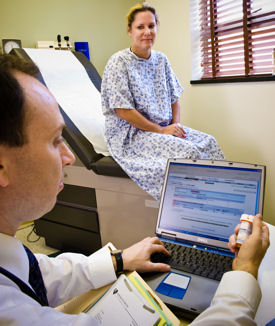Son's plea to prolong life at any cost sparks ethical quandary
Physicians aren't obligated to provide end-of-life care that is ineffective or harmful, by Lachlan Forrow, FACP.
An 81-year-old woman has been in the ICU for 16 days with pneumonia, acute respiratory distress syndrome and protracted sepsis, requiring massive fluid support and pressors to maintain her blood pressure. She is over 20 liters net fluid-positive, despite continuous veno-venous hemofiltration (CVVH) dialysis, with diffusely weeping skin.
She moans occasionally, including almost always when being turned, and is able to tolerate only limited opioids because of her hypotension. Nursing staff voice increasing concern that continued life support is inhumane and undignified, but her son insists to the attending physician that “everything be done” and that “where there is life, there is hope.” He also points out that as his mother's legally designated health care proxy he has full legal authority to make decisions on her behalf.
Commentary
We live in the “patient autonomy” era, which has transformed clinical decision-making largely in very positive ways. Long gone are the days when a physician would assess a patient, determine what care was most appropriate, and explain that approach to the patient who dutifully followed doctor's orders.
From routine outpatient care to life-and-death decisions in the ICU, patients today often believe in, and sometimes insist on, their right to direct treatment plans. At times it is almost as if the doctor should follow “patient's orders” and that to do otherwise is to fail to respect patient autonomy. This is not so.
The problem arises most intensely in the context of life support issues in the ICU. In the case described above, it appears quite possible to extend the patient's life for a prolonged period. Her son, who has formal legal authority to act as her surrogate decision-maker, argues that the job of the medical and nursing staff is to fight for his mother's life, whatever that entails. What ethical grounds could ICU staff have for refusing, allowing her to die when she might live?
A competent patient, or an appropriate surrogate acting on his or her behalf, has the right to refuse any treatment, even one that is life-saving. But this does not entail a right to insist that a desired treatment be provided.
Several years ago, our medical center (Beth Israel Deaconess Medical Center in Boston) adopted a policy on ineffective or harmful treatments, which states: “No patient should be forced to undergo, nor should any physician or health professional be forced to provide, a treatment that is ineffective or harmful. A medical treatment is ineffective if there is no reasonable likelihood that it will achieve a medical benefit to the patient. A medical treatment is harmful if the likely suffering or risk of other harm caused by the treatment grossly outweighs any medical benefit to the patient.”
Whether a treatment is ineffective or harmful is based on the attending physician's clinical judgment. If the patient or surrogate disagrees, then a second or third opinion, and/or transfer to another physician or hospital, may be sought.
Under no circumstances, whether in the ICU or elsewhere, should an attending provider be forced to engage in clinical care that seriously violates her or his professional standards, conscience or integrity.
In the case above, the attending physician should first determine—preferably in close consultation with nursing staff—what interventions or burdens are outside the bounds of good medical/nursing care, either because they cannot achieve a patient-centered goal or because administering them would be harmful or inhumane.
The attending should then explain to the son that interventions that fall into these categories will not be offered. If the son disagrees, his only recourse is to find another physician or facility willing to administer those interventions.
Follow-up
Support from a hospital's ethics service and/or legal department is usually helpful in such cases. The attending physician contacted the hospital's Ethics Support Service and a representative met with the son. After listening to the son's perspective, the Ethics Service representative expressed sympathy, but then explained, “But of course you understand, no one can force a doctor or nurse to do something that he or she thinks is bad medical care, and Dr. P. and the nurses are reaching the point where in their judgment the chance of any recovery is remotely unlikely, and continuing the fluids, pressors and other treatments is becoming simply inhumane.
Dr. P. told me that she would be willing to continue for two more days, knowing how much you are hoping for a miracle, but that if your mother isn't better at that point then she will need to stop the CVVH, fluids and pressors.”
While the son did not appear pleased with this news, he did not object. Staff joined him over the next 48 hours in hoping for a miracle that did not arrive. Fluid and pressor support was then discontinued, and the patient died later that day with the son at her bedside, comforted by ICU staff.




